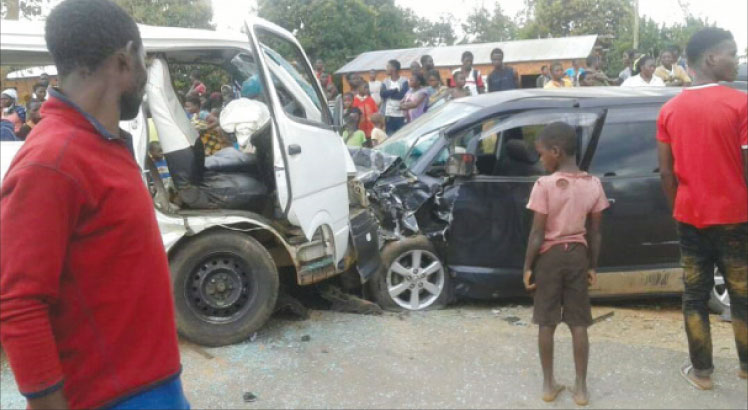John Mhone, 36, sells fish in Mzuzu City. He travels between the ever-green city and Nkhata Bay almost daily.
‘‘I’m usually on the road, but it is a nightmare because taxi and minibus operators pack us like sardines. We don’t have a choice or a voice,’’ he says.
These overcrowded vehicles seldom leave passengers behind.
“Their thirst for money is just unquenchable, ’’ Mhone laments. “In case of an accident, I doubt if anyone would escape alive.’’
Mhone feels baffled that the risky congested vehicles freely speed past multitudes of traffic police officers on the country’s roads.
He narrates: ‘‘The police stop the vehicles, but swiftly wave the drivers to pass after paying fines or kickbacks.
“I wonder if exceeding a vehicle’s capacity is still a traffic offence here. Does a crime cease when one pays?’’
There are similar tales on the Mzuzu-Mzimba stretch of the M1, where Ephraim Banda is a regular road user.
A road accident that occured near Mpamba Trading Centre on Mzuzu-Nkhata Bay Road
He states: ‘‘Most minibus and taxi drivers just pay for a general receipt as a pass knowing they will be exceeding capacity that day.
“Is the GR or paying a fine a licence to continue committing the offence?”
Banda is concerned that passengers in the country are taken for a ride by minibus drivers that observe maximum capacity when leaving depots but cram more along the way.
He asks the police to restore sanity and make the law work.
The commuters’ complaints are widespread in both rural and urban roads nationwide.
However, some passengers sanction the risky tendencies by boarding minibuses or taxis that are full.
‘‘Would public transport exceed capacity if commuters stopped forcing themselves into full vehicles?” asks Julius Yelemia of Chanthomba in Mzimba.
The businessperson urges government to fine travellers who jump into vehicles that are already full.
The Road Traffic Act prescribes a K10 000 fine for exceeding a vehicle’s capacity.
When asked about the over-packed rides seen on the country roads, Directorate of Road Traffic and Safety Services spokesperson Angelina Makwecha referred Malawi News Agency to the police.
National Police deputy public relations officer Harry Namwaza says the spirit of the law requires law enforcers to fine the driver and offload the excess passengers.
‘‘The mandate of traffic police is to prioritise safety of passengers and those travelling in cars, ’’ he explains. “If a minibus is supposed to carry 15 passengers, its insurance only covers those 15 people if an accident occurs.”
Minibus Owners Association of Malawi general secretary Coaxley Kamange says the rampant cases of passenger vehicles carrying too many people require a collective solution.
‘‘The problem needs collective effort of both passengers and operators as some travellers force themselves into congested vehicles because they are rushing or to negotiate a lower fare. On the other hand, operators break the law to cash in on the passengers,’’ he says.
Kamange warns against overloading, saying it heightens the risk of accidents and disease outbreaks such as Covid-19 and flu.
‘‘Airborne diseases spread fast in overcrowded places,” he states.
Chikondi Silwimba, a passenger interviewed at Jenda in Mzimba, urges travellers to leave on time and desist from squeezing themselves into crammed vehicles.n
The post Stuffed rides in police view first appeared on The Nation Online.
 Moni Malawi
Moni Malawi 

